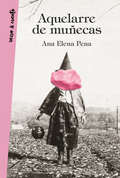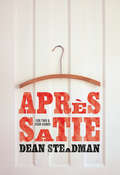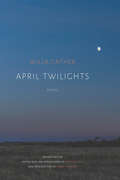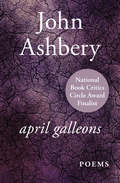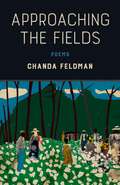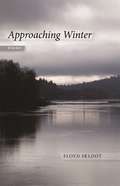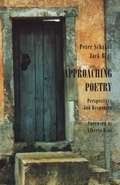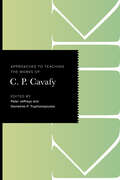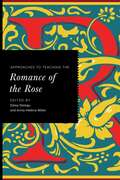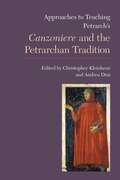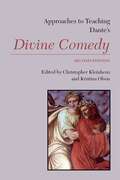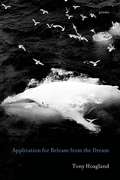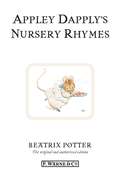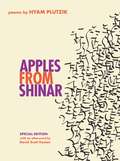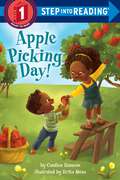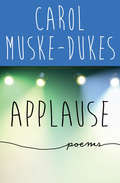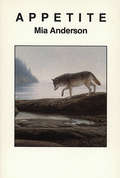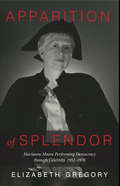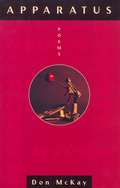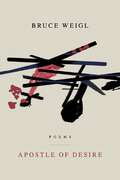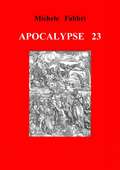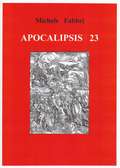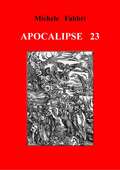- Table View
- List View
Aquelarre de muñecas
by Ana Elena PenaUn viaje oscuramente luminoso que invita al diálogo de la mujer adulta con la niña interior, tan cerca la una de la otra y, a la vez, tan lejos. Estos textos, a medio camino entre la expresión poética y la narración, componen una mirada agridulce a la infancia, con sus fantasmas y terrores, pero también son un canto a la inocencia, a la juventud, a la libertad, a la amistad y a los pequeños milagros que pasan desapercibidos. Desde la honestidad más salvaje, Ana Elena Pena habla del descubrimiento precoz y abrupto del sexo y la violencia, de los desengaños de la vida adulta, la figura ambivalente de la madre y el miedo a la muerte y al abandono. Una declaración de las propias debilidades desde la mirada ingenua de quien está descubriendo el mundo. La crítica ha dicho...«Ana Elena vive las cosas tan desde dentro, que no se permite levantar la barrera y pasar de ahí. Tal vez por eso es tan cruda y sincera. Y tal vez por eso llega tan lejos y a tanta gente».Tentaciones de El País «Su obra es un viaje surrealista de colores vivos y trazos suaves que nos enfrenta a los miedos y obsesiones de la sociedad moderna, a la vez que critica ferozmente el culto exagerado a la belleza, el abuso y la violencia en todas sus formas».20 Minutos
Après Satie: For Two and Four Hands
by Dean SteadmanA man who might be Erik Satie floats, a la Magritte, above Paris rooftops, thinking of a newly-extinct species of songbirds, "contemplating grief in the absence of song." By turns tender, wry, playful and fierce, the poems in Dean Steadman’s second collection, Apres Satie -- For Two and Four Hands, use surreal imagery, recurring characters and cyclical themes to evoke the repetitive nature of much of Satie’s music, as well as the artistic and intellectual temperament of Paris during Satie's most creative years. The prose poems in the collection borrow titles from Satie's piano compositions, and all of the poems are annotated in a manner similar to Satie's published scores, using a selection of his performance instructions (for example, "like a nightingale with a toothache"). From the affair of Satie and painter Suzanne Valadon to the glimpsed lives of a contortionist, a French cowboy, a Falling Man, and a Floating Woman in the Dada-inflected prose poems, to the musings in other poetic forms that draw us forward in time, to a present-day hospice, or back, to the gallop of a mounted huntress, Apres Satie involves us in the ongoing muddle of pain, sorrow, compassion, passion, joy and curiousness that is our human condition.
April Twilights (1903)
by Willa CatherBefore she wrote her prose masterpieces, Willa Cather produced striking poems, which were collected in 1903 in April Twilights. It was her literary debut, preceding the publication of O Pioneers! by nine years. In her introduction, distinguished Cather scholar Bernice Slote notes that this early edition of April Twilights restores what had been "an almost lost, certainly blurred, portion of the creative life of a great novelist." Among the thirty-seven selections are the much-anthologized "Grandmither, Think Not I Forget" and the highly evocative "Prairie Dawn." This new edition includes a new introduction by Robert Thacker, which provides new insights into Cather and her poetry.
April Galleons: Poems
by John AshberyIn Ashbery&’s 1987 collection, ballads, folklore, and fairy tales mesh with the anxieties and idioms of modern lifeFor a book by one of the leading avant-garde poets of modern literature, John Ashbery&’s April Galleons is suffused with voices from the past. There are echoes of the Romantics in the elegiac &“A Mood of Quiet Beauty&” and &“Vetiver,&” allusions to ballads and folkloric epics in &“Finnish Rhapsody&” and &“Forgotten Song,&” and veiled references to legends, folk songs, and fairy tales. But as always with Ashbery, the modern world is the microphone through which these past voices are made to speak, amplified and invigorated by Ashbery&’s signature wit and generosity of spirit. A finalist for the National Book Critics Circle Award in the year in which it was first published, April Galleons is a must-read collection from a notable period in John Ashbery&’s long and lauded career.
April Foolishness
by Teresa Bateman Nadine Bernard WestcottIt's a spring morning on the farm. Grandpa is fixing breakfast for his visiting grandkids. Suddenly his grandson reports that the cows have got loose! He thinks Big Brown Bessie just stepped on a goose! But Grandpa isn't at all upset at this news- he just pours himself a glass of milk! Why is Grandpa so cool? Because he knows the kids are trying to play an April Fool's trick! And then Grandma steps in with a trick of her own.
Approaching the Fields: Poems
by Chanda FeldmanElegiac and fierce, solemn and celebratory, the poems in Chanda Feldman’s Approaching the Fields consider family and history. From black sharecroppers and subsistence farmers along the Mississippi River to contemporary life in the suburbs, the rituals of home and work link racial experience, social lines, and economic striving, rooting memory and scene in the southern landscape. Love and violence echo through the collection, and Feldman’s beautifully crafted poems, often formal in style, answer them sometimes with an embrace and sometimes with a turning away. She witnesses the crop fields and manicured lawns, the dinner table and birthing room, the church and juke joint, conveying the ways that everyday details help build a life.These evocative poems bring to life a rich and complex world, both timely and timeless.
Approaching Winter: Poems
by Floyd SklootFloyd Skloot's eighth poetry collection, Approaching Winter, evokes the fluid and dynamic nature of memory as it ebbs and floods through our daily lives. Here the real and the imagined intermingle freely: In one poem, the cry of eagles reflects the wails of an infant daughter, long since grown and gone; in another, an aging Samuel Beckett prepares to throw the first pitch at Ebbets Field. Traveling from Portland's Willamette River, which borders Skloot's home, to the hushed landscapes of the afterlife, the poems in this collection acknowledge the passage of time and the inevitable darkness that lies ahead. Yet Skloot also remains attuned to the urgency of the present moment, as he admires the plumage of the local birds in the short days before their journey south for the winter. By turns whimsical and meditative, Approaching Winter gives voice to the struggle to find coherence in a fragmented world.
Approaching Poetry: Perspectives and Responses
by Jack Ridl Peter SchakelThis wide-ranging introduction to poetry blends theoretical considerations with a thorough introduction to the elements of poetry, offering alternative perspectives from which to approach and engage with a poem.
Approaches to Teaching the Works of C. P. Cavafy (Approaches to Teaching World Literature #175)
by Peter Jeffreys Demetres P. TryphonopoulosKnown as a preeminent poet of queer male desire, C. P. Cavafy lived most of his life as part of the Greek minority community in Alexandria, Egypt. He was inspired by the possibilities offered by peripheries, whether sexual, geographic, or historical. Volumes of his poems, widely translated into English, give anglophone readers access to his distinctive mixture of irony and tenderness, directness and subtlety.This volume will help instructors introduce students to Cavafy's works and explore them from many angles with the help of the extensive archives now available. Essays address teaching Cavafy both as a poetic historian of the Hellenistic, Roman, and Byzantine worlds and through the lens of postcoloniality. They also explore how he interpreted classical Greek works and how his work has been interpreted by composers, poets, and readers within and beyond Greece and the Greek diaspora.
Approaches to Teaching the Romance of the Rose (Approaches to Teaching World Literature #170)
by Daisy Delogu and Anne-Hélène MillerOne of the most influential texts of its time, the Romance of the Rose offers readers a window into the world view of the late Middle Ages in Europe, including notions of moral philosophy and courtly love. Yet the Rose also explores topics that remain relevant to readers today, such as gender, desire, and the power of speech. Students, however, can find the work challenging because of its dual authorship by Guillaume de Lorris and Jean de Meun, its structure as an allegorical dream vision, and its encyclopedic length and scope. The essays in this volume offer strategies for teaching the poem with confidence and enjoyment. Part 1, "Materials," suggests helpful background resources. Part 2, "Approaches," presents contexts, critical approaches, and strategies for teaching the work and its classical and medieval sources, illustrations, and adaptations as well as the intellectual debates that surrounded it.
Approaches to Teaching Petrarch's Canzoniere and the Petrarchan Tradition (Approaches to Teaching World Literature #129)
by Christopher Kleinhenz Andrea DiniOne of the most important authors of the Middle Ages, Petrarch occupies a complex position: historically, he is a medieval author, but, philosophically, he heralds humanism and the Renaissance. Teachers of Petrarch's Canzoniere and his formative influence on the canon of Western European poetry face particular challenges. Petrarch's poetic style brings together the classical tradition, Christianity, an exalted sense of poetic vocation, and an obsessive love for Laura during her life and after her death in ways that can seem at once very strange and--because of his style's immense influence--very familiar to students. This volume aims to meet the varied needs of instructors, whether they teach Petrarch in Italian or in translation, in surveys or in specialized courses, by providing a wealth of pedagogical approaches to Petrarch and his legacy.Part 1, "Materials," reviews the extensive bibliography on Petrarch and Petrarchism, covering editions and translations of the Canzoniere, secondary works, and music and other audiovisual and electronic resources. Part 2, "Approaches," opens with essays on teaching the Canzoniere and continues with essays on teaching the Petrarchan tradition. Some contributors use the design and structure of the Canzoniere as entryways into the work; others approach it through discussion of Petrarch's literary influences and subject matter or through the context of medieval Christianity and culture. The essays on Petrarchism map the poet's influence on the Italian lyric tradition as well as on other national literatures, including Spanish, French, English, and Russian.
Approaches to Teaching Dante's Divine Comedy (Approaches to Teaching World Literature #163)
by Christopher Kleinhenz and Kristina OlsonDante's Divine Comedy can compel and shock readers: it combines intense emotion and psychological insight with medieval theology and philosophy. This volume will help instructors lead their students through the many dimensions--historical, literary, religious, and ethical--that make the work so rewarding and enduringly relevant yet so difficult.Part 1, "Materials," gives instructors an overview of the important scholarship on the Divine Comedy. The essays of part 2, "Approaches," describe ways to teach the work in the light of its contemporary culture and ours. Various teaching situations (a first-year seminar, a creative writing class, high school, a prison) are considered, and the many available translations are discussed.
Application for Release from the Dream: Poems
by Tony HoaglandThe eagerly awaited, brilliant, and engaging new poems by Tony Hoagland, author of What Narcissism Means to Me The parade for the slain police officergoes past the bakeryand the smell of fresh breadmakes the mourners salivate against their will.—from "Note to Reality"Are we corrupt or innocent, fragmented or whole? Are responsibility and freedom irreconcilable? Do we value memory or succumb to our forgetfulness? Application for Release from the Dream, Tony Hoagland's fifth collection of poems, pursues these questions with the hobnailed abandon of one who needs to know how a citizen of twenty-first-century America can stay human. With whiplash nerve and tender curiosity, Hoagland both surveys the damage and finds the wonder that makes living worthwhile. Mirthful, fearless, and precise, these poems are full of judgment and mercy.
Appley Dapply's Nursery Rhymes (Beatrix Potter Originals)
by Beatrix PotterThis original, authorised version has been lovingly recreated electronically for the first time, with reproductions of Potter's unmistakeable artwork optimised for use on colour devices such as the iPad. Beatrix Potter gathered material for a book of rhymes over many years. In 1917, when her publisher was in financial difficulties and needed her help, she suggested that Appley Dapply's Nursery Rhymes could be brought out quickly, using her existing collection of rhymes and drawings. The fact that the illustrations were painted at different times explains why the style occasionally varies.Appley Dapply's Nursery Rhymes is number 22 in Beatrix Potter's series of 23 little books, the titles of which are as follows:1 The Tale of Peter Rabbit2 The Tale of Squirrel Nutkin3 The Tailor of Gloucester4 The Tale of Benjamin Bunny5 The Tale of Two Bad Mice6 The Tale of Mrs. Tiggy-Winkle7 The Tale of Mr. Jeremy Fisher8 The Tale of Tom Kitten9 The Tale of Jemima Puddle-Duck10 The Tale of the Flopsy Bunnies11 The Tale of Mrs. Tittlemouse12 The Tale of Timmy Tiptoes13 The Tale of Johnny Town-Mouse 14 The Tale of Mr. Tod15 The Tale of Pigling Bland16 The Tale of Samuel Whiskers17 The Tale of The Pie and the Patty-Pan18 The Tale of Ginger and Pickles19 The Tale of Little Pig Robinson20 The Story of a Fierce Bad Rabbit21 The Story of Miss Moppet22 Appley Dapply's Nursery Rhymes23 Cecily Parsley's Nursery Rhymes
Apples from Shinar (Wesleyan Poetry Series)
by David Scott Kastan Hyam PlutzikApples from Shinar was Hyam Plutzik's second complete collection. Originally published in 1959 as a part of Wesleyan University Press's newly minted poetry series, the collection includes "The Shepherd"--a section of the book-length poem "Horatio," which earned Plutzik a finalist position for the Pulitzer Prize. "The love and the words and the simplicity," that mark Plutzik's poetry, writes Philip Booth, "are all here [in Apples from Shinar], and the poems come peacefully, and wonderfully, alive." With a previously unpublished foreword by Hyam Plutzik and a new afterword by David Scott Kastan, this edition marks the centenary of Plutzik's birth and will introduce a new generation of readers to the work of one of the best mid-century American poets.
Apple Picking Day! (Step into Reading)
by Candice RansomWho doesn&’t love to go apple picking at the first sign of fall? A sister and brother celebrate autumn with a trip to a local apple orchard in this simple, rhyming Step 1 early reader. The kids bound with glee through the rows of trees, and race against other children to pick the most and the best apples. The story of their day is bright, fun, and full of light action. It&’s told in easy-to-follow rhyme, ensuring a successful reading experience. Step 1 Readers feature big type and easy words. Rhymes and rhythmic text paired with picture clues help children decode the story. These books are for children who know the alphabet and are eager to begin reading.
Applause: Poems
by Carol Muske-DukesNational Book Award finalist Carol Muske-Dukes explores joy, dread, and the solitary communion of applauseApplause provides twenty vivid and evocative poems by Carol Muske-Dukes. In &“Dream,&” she seeks the past in reverie, along with bicoastal riffs on New York City and Los Angeles. &“The Eulogy&” paints the scene of a funeral in sunny California where a young man who has died of AIDS is laid to rest. In the title poem, a twelve-part journey through the ritual of applause, Muske-Dukes examines the power of a gesture—clapping—to transform oneself from individual to communal. &“What a strange phenomenon,&” she says, &“to be single and plural at once, to feel joy and dread simultaneously, to wish to acknowledge publicly one&’s anonymity.&”
Appetite
by Mia AndersonVerve, energy, wit, piquance and pure linguistic excitement: Mia Anderson's poetry is a whole cookbook of poetic experiences. Anderson is always ready to take big risks, and her work shows her love of life in its manyness and accident, as well as a delight in the intricate prism of language. Appetite includes the long poem sequence "The Saugeen Sonata" which won The Malahat Review's Long Poem Prize in 1988.
Apparition of Splendor: Marianne Moore Performing Democracy through Celebrity, 1952–1970
by Elizabeth GregoryWhile the later work of the great Modernist poet Marianne Moore was hugely popular during her final two decades, since her death critics have condemned it as trivial. This book challenges that assessment: with fresh readings of many of the late poems and of the iconic, cross-dressing public persona Moore developed to deliver them, Apparition of Splendor demonstrates that Moore used her late-life celebrity to activate egalitarian principles that had long animated her poetry, in daring and innovative ways. Dressed as George Washington in cape and tricorn and writing about accessible topics, she reached a wide cross-section of Americans, engaging them in consideration of what democracy means in their daily lives, around issues of gender, sexuality, racial integration, class, age, immigration, and species-ism. Her work resonates with that of her younger contemporaries, including poets like John Ashbery, Frank O’Hara, and Elizabeth Bishop, and artists like Andy Warhol, Yoko Ono, and Ray Johnson. Published by the University of Delaware Press. Distributed worldwide by Rutgers University Press.
Apparatus
by Don Mckay“There’s a place / between desire and memory, some back porch / we can neither wish for nor recall,” writes Don McKay inApparatus. The poems in this collection home in on that place – those keenly desired places – where language will not reach. Apparatusis Don McKay’s first collection of new poems since his 1991 award-winningNight Field. It is a passionate engagement with nature and a powerful critique of human assaults on wilderness which, for McKay, is more than unsubdued nature; it is whatever eludes the mind’s categories – the insoluble secret of life itself. To read McKay’s poems is to be in touch with the significant concerns of our time and all time. McKay is a poet of unmatched linguistic playfulness, with virtuoso flexibility of voice and an ability to shape-shift through forms, tones, and styles.
Apostle of Desire
by Bruce WeiglTwo-time Pulitzer Prize finalist and one of America’s most revered military veteran writers —Bruce Weigl brings readers face-to-face with our country’s legacy of violence, the suffering of combat PTSD, and what it means to be truly haunted.Taking its cue from James Wright’s goal to write “the poetry of a grown man,” the poems in Apostle of Desire juxtapose the peace and comfort offered by the natural world with the bruising intensity of manmade violence. These sudden tonal shifts express a vulnerability and extremity of feeling that strips audiences’ own emotions bare, leading readers to question their roles as bystanders and consumers of violent media.In sharing his intertwining feelings of love and shame for both country and self, Weigl places readers into the role of the watcher and opens a window into the traumas of the Vietnam War and life’s daily battles with PTSD. The honesty of Weigl’s poetry exposes the ghosts of pain while still witnessing the glories of love, nature, and his ongoing experiences with the rich daily life of contemporary Vietnam.Readers will face the solitude of regret and the hopeful pursuit of redemption—remembering the past and looking toward the future.
Apocalypse 23
by Michele Fabbri"Apocalypse 23" has won numerous literary awards and has been welcomed by critics. It has became a cult book thanks to bookcrossing as has long been the first book in the ranking of "most traveled" and still is the first Italian book in standings.
Apocalypse 23
by Michele FabbriUne compilation de poésie obscure et inquiétante: qui habet aurem audiat...
Apocalipsis 23
by Michele Fabbri"Apocalipsis 23" ha obtenido numerosos premios literarios y ha sido acogido con favor de la crítica. Se ha vuelto libro de culto gracias al bookcrossing, pues ha estado durante largo tiempo como el primer libro en la clasificación de los "most traveled" y aún es el primer libro italiano en ese puesto.
Apocalipse 23
by Michele Fabbri"Apocalipse 23" já ganhou incontáveis prêmios literários e foi bem recebido pelos críticos. Tornou-se um livro cult através do BookCrossing, pois tem sido o primeiro livro no ranking dos "most traveled" e ainda é o primeiro livro em italiano nessa classificação.
